Interview: Playwright Wendy Graf on EXIT WOUNDS World Premiere at International City Theatre
August 25 – September 10
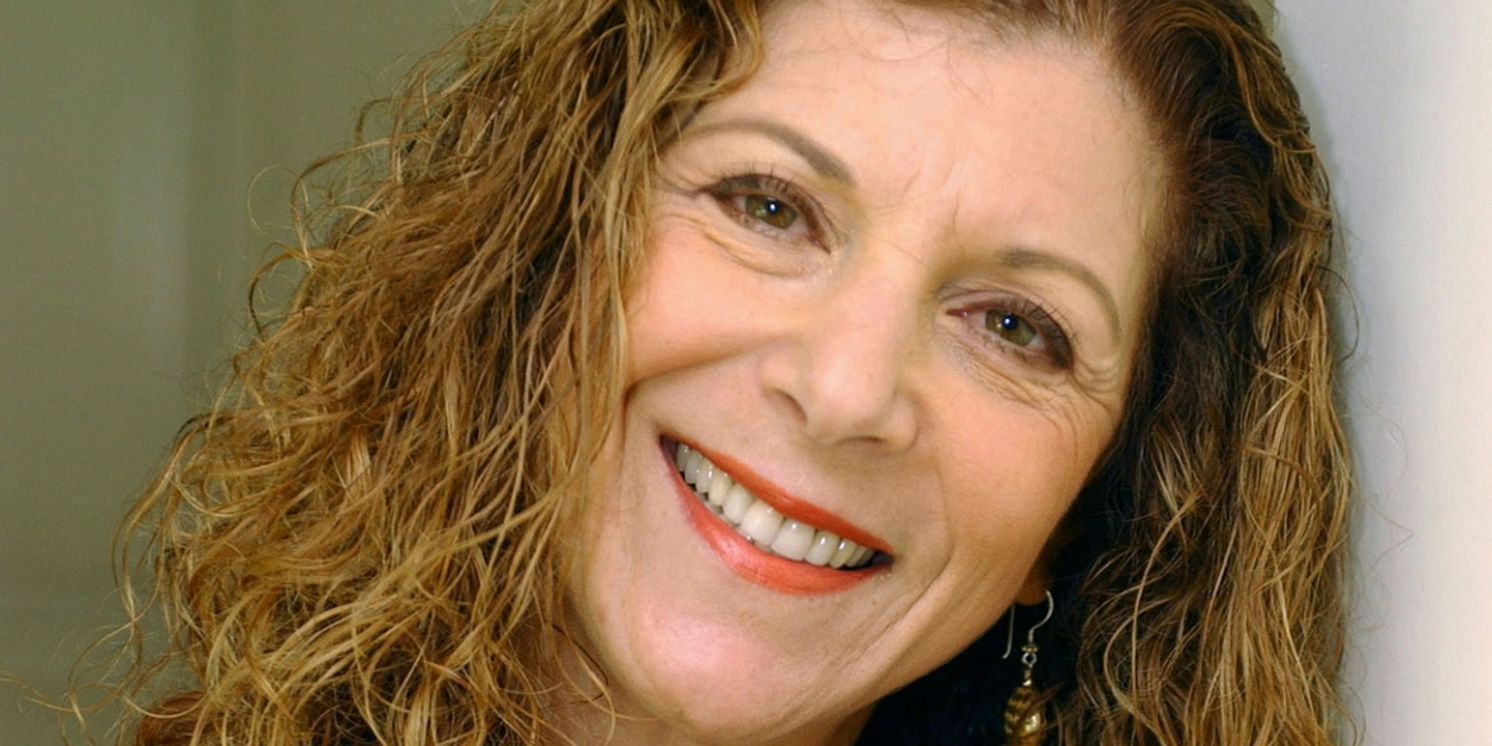
In 2019, Playwright Wendy Graf was named the inaugural Gold Medallion winner by the Moss Hart & Kitty Carlisle Hart New Play Initiative for her play Exit Wounds, beating out 1241 plays from five countries and 43 states. As one of the two finalists, her play received a workshop production at the Grove Theater Center in Burbank in Oct.-Nov. 2019 during the final step of the process. And now, the world premiere of Graf’s play Exit Wounds is taking place at International City Theatre in Long Beach for a three-week run, August 25 through September 10, directed by ICT producing artistic director caryn desai [sic].
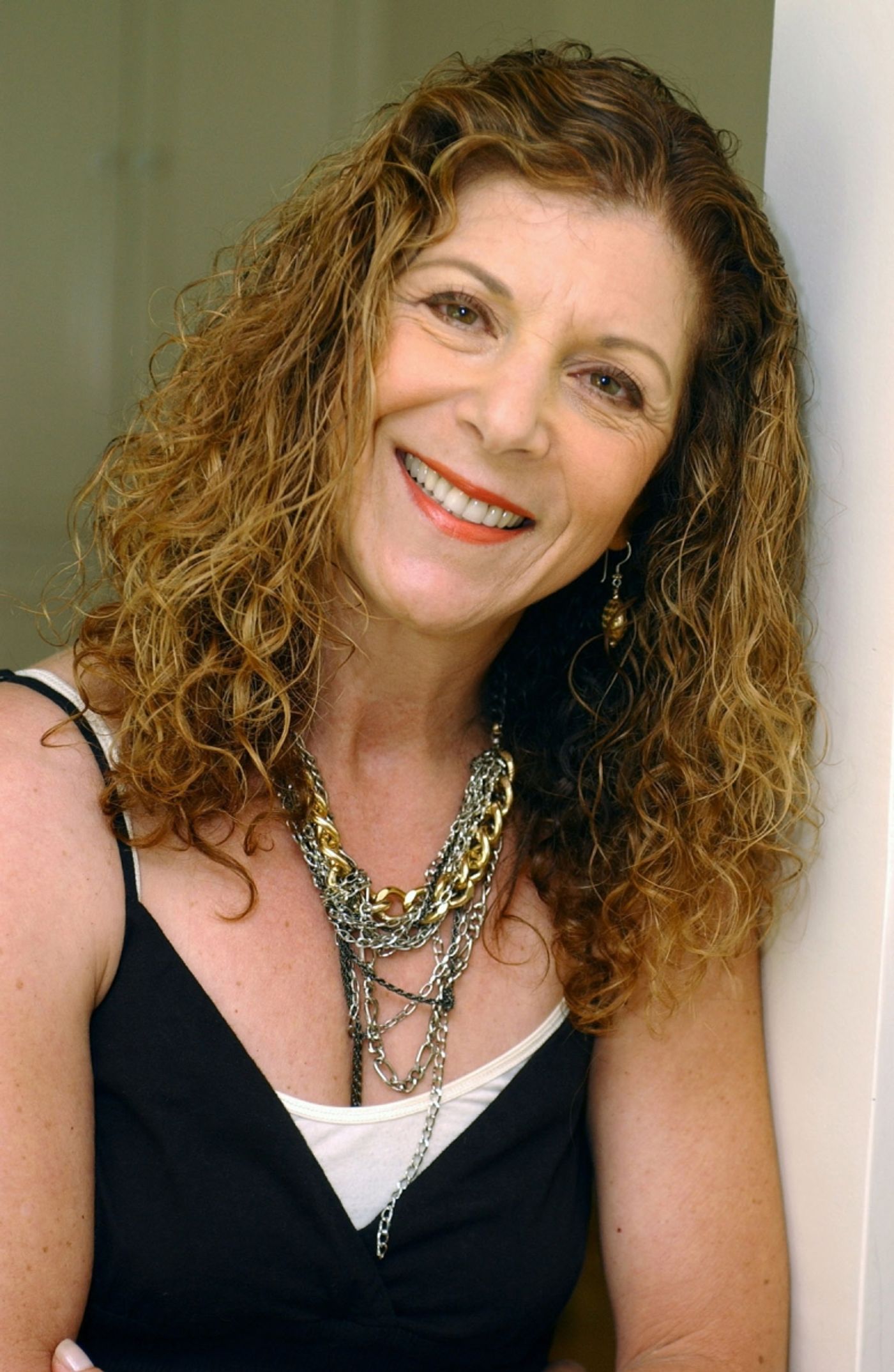
Playwright Wendy Graf. Photo by Rich Schmitt
I decided to speak with Wendy on her process for creating the play, being acknowledged as a best new play in such a prestigious competition, why she decided to hold the world premiere at ICT, and how she hopes audiences will connect with its story about healing, hope, and compassion when someone you love has committed a terrible crime.
Hi Wendy. Thanks for speaking with me about the upcoming world premiere of your play Exit Wounds. Tell me about yourself and why you decided to become a playwright.
“You are a storyteller!” That’s what the late, great Gordon Davidson, my most important and beloved mentor, told me years ago. I have always been a theater lover and a storyteller - as a child and teenager, I wrote skits and scenes and was always “putting on a show.” I wanted to be an actress. I began writing things for me to act in, including a standup act that I performed all over Los Angeles. When I became involved at Theatre East, I began trying my hand at writing full-length plays that I would star in. Well… I wasn’t a very good actress. But during this time, I met a successful TV writer-producer who became familiar with my work. One day he brought me a stack of TV scripts, plopped them down in front of me and said, “Write one of these - you will make a fortune in television.” I did, and I went on to have a successful career in TV, writing for such shows as Murder, She Wrote, ALF, and the first season of Full House among others. My TV career ended, however, with the birth of my second child since I couldn’t keep up the hours of a staff writer on Growing Pains.
I then went on to write screenplays for a couple of years that were optioned but never made. Frustrated, I looked for something else to do. My husband, a criminal attorney, one day told me he didn’t like his private investigator, and based on my work on Murder, She Wrote, I said, “I can do that!” I then went back to school to the Nick Harris Detective Academy - one of the most fun things I ever did - and went on to work for my 3,000 hours, took the PI State test and got my license. Being a PI is being a storyteller; you are the writer, the actor, and the director to get the facts and the story. Meanwhile, while I was working undercover and serving process and wishing I were back in the theater, my 13-year-old daughter (at the time) went to Idyllwild Arts for the summer and took Playwriting. There she wrote a play which she produced and directed. Inspired by her, I said to myself, “It’s time to get back to what I really love,” and then I wrote my first professionally produced play. Over 30 productions later, the rest is history! I still maintain my PI license but it doesn’t give me the same thrill or feed my soul as the theater does. Being a playwright is who I am.
How did you find out about the Moss Hart & Kitty Carlisle Hart New Play Initiative? Did you always think Exit Wounds could win the competition?
I can’t remember where I first saw the call for submissions since there are many submission sites for playwrights. I did as I always do - make at least a hundred submissions and then forget about it, never expecting to win. You must submit dozens of times, and once in a while you get lucky. Then in April 2018 when my play, Unemployed Elephants – A Love Story, had its closing performance at the Victory Theater, Kevin Cochran and Charles Johansen, two of the three heads of the Initiative, came to the play, and afterwards Kevin came up to me and told me I was a semifinalist and that they loved Exit Wounds! I was so surprised and pleased. A month or so later they informed me I was a finalist; one of four plays awarded a workshop/staged reading at 59E59 Theater in New York! I was thrilled, and that was an amazing experience. I knew that next, two of the four plays were to be given workshop performances in Burbank. I was kind of on pins and needles, but I had a good feeling, based on the response in New York. I didn’t find out till a few months later that Exit Wounds would be one of the two plays in the workshop, and that was November 2018. The last step was for one of the two plays to be awarded the Gold Medallion, and in April 2019 I was thrilled to be informed it was Exit Wounds!
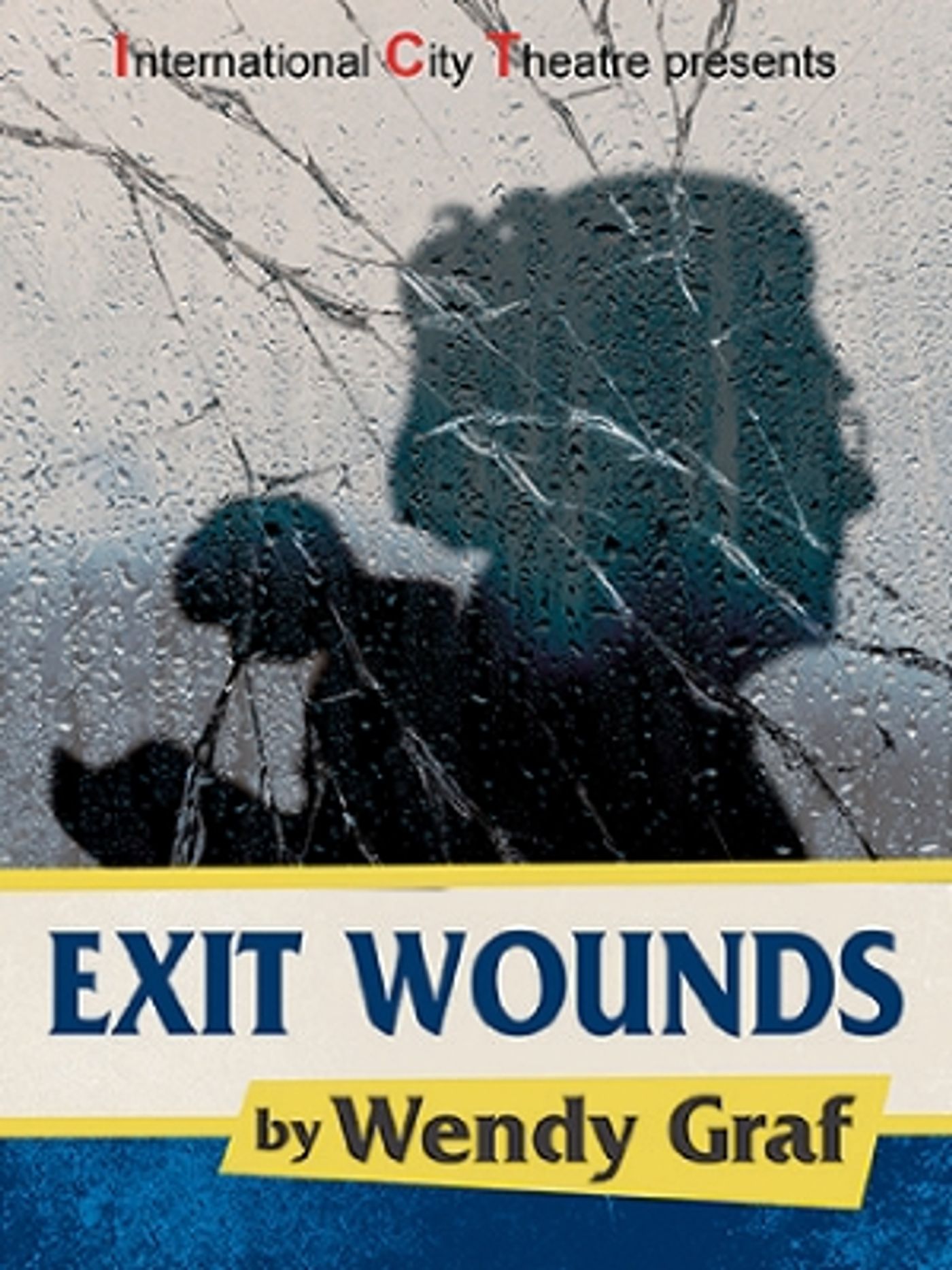
Did more than the COVID shutdown get in the way of scheduling the play’s world premiere until now?
It was a confluence of factors, a boomerang of circumstances. After I won the Gold Medallion, Exit Wounds was optioned by a seasoned New York producer, and I thought,“this is it, I’m finally on my way!” Because page to stage is always a long process, we spent a few months getting the play into perfect shape, discussing places to submit, potential directors and actors. Late in 2019 we were ready to go and make the first submission to an actress who shall remain nameless.
And then…March 2020 arrived. The momentum had evaporated, the option dissolved, and all bets were off for at least two years. The producer encouraged me to write a screenplay based on the play and see if I discovered anything new. I did find some new things, which I added into the play. When Covid looked like it was going to be over and theaters were returning to work, I was anxious to submit again. However, they had a huge backlog of cancelled productions, so they weren’t taking any new submissions for at least a year. The producer told me to be patient (not my strong suit) and it would happen when the time was right; it would be done since it was too good and important a play. He was correct - the right moment is now! (Note: He no longer holds the option, but we have continued to be good friends and colleagues.)
Tell me about your process for writing Exit Wounds.
There’s never just one thing that inspires a play, and finally putting pen to paper is a journey. I call it “finding a play,” much like a sculptor who chips away and chips away at a block of marble until he finds the statue inside. I am a “what if” storyteller and inspired by “what if” possibilities. This time it was “What if you were the child of an evil parent or family?” So, of course, the first place I went to was Nazis. I read articles and memoirs and watched all these documentaries about children of Nazis. I concluded who wants to see another play about Nazis? (I did, however, learn something important in those stories, that all the members of the family had different reactions to the infamy. Some changed their names and some stayed and defended and refused to accept what their parent had done. I used some of this in crafting Matt, the second son in Exit Wounds.)
Then I read an article about the daughter of a serial killer, and I went down that road for a while. Finally, with all the rising gun violence and mass shootings, Columbine and Sandy Hook and Virginia Tech popped into my mind. Again, what if? We always hear about the families of the victims, but what happens to the families of the perpetrators? What happens to them? Can they ever live a normal life again? I started the research phase of the journey, interviewing, reading, and watching everything I could find about perpetrator’s families.
As I got deeper in, I wondered if entire families could become defined by the actions of one member and how the fallout from one person’s act can affect future generations. One of the things that also came up for me was the notion of viewing a family member through a lens of another family member. Is this legitimate? Do they actually see these qualities in another family member or are they projecting these qualities onto them? Does the past dictate the future? These are the questions I loved exploring.
Finally…pen to paper. The first thing I did was write my “vomit it out” draft. Get it all down, don’t go back, keep moving on. After that draft was finished, because you must hear it, I invited some actor friends and my go to playwright friends to come over for lunch, read the play around the dining room table, and discuss over chicken salad. After that…. rewrite.
Next Exit Wounds was chosen as part of Open Fist’s First Look at the end of 2017, and we did a valuable first workshop resulting in a two-night staged reading. Then…rewrite again. Next, we did another staged reading at Interact and…rewrite again, just in time for the Hart workshop/reading at 59E59 Theater in July 2018. After that…rewrite again.
Then finally the November 2018 workshop in Burbank where I could really dive into the play and further refine. After more tinkering, the writing of the screenplay, incorporating some of the things from the screenplay into the stage play, and hearing the first table read at ICT, when I said, “let’s cut those scenes since they worked for the screenplay but not the play” and caryn agreed, here we are at what you will see onstage when it opens August 25!
Why did you decide to hold its world premiere at ICT?
In 2021 my play, Closely Related Keys, was produced at ICT. It was the first time I had worked there, and it was a wonderful, joyful, enriching experience. I loved everything about ICT, became a huge fan and for the last three years bought season tickets. The seasons are very well curated and balanced, and every show is beautifully realized. I developed a great relationship with caryn, and I decided to send her Exit Wounds for this season as I thought it fit ICT’s sensibilities.
Have you worked with director caryn desai before?
I have not, as she didn’t direct Closely Related Keys. However, over the last three seasons, I have experienced her direction, especially with Valley Song last season and found her an exquisite, sensitive director with huge insights into human behavior. In my conversations with her about Exit Wounds, I felt we were totally on the same page as to what the play was about and how to tell the story. When she finally told me she wanted to include Exit Wounds in this season, I said how much I would love if she directed. And so it came to pass!
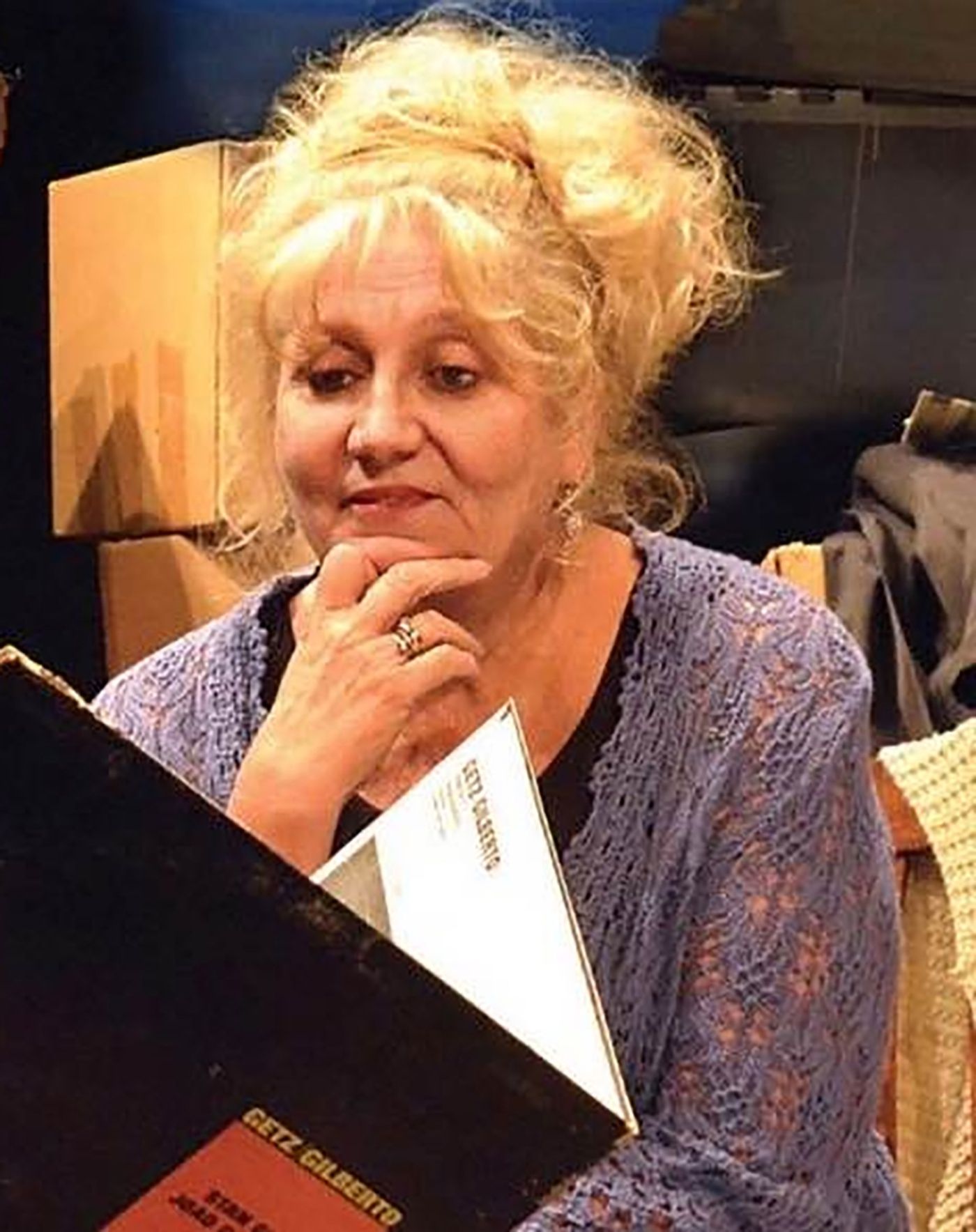
Suanne Spoke. Photo by Ed Krieger
Tell me about the three generations of characters in it.
Unable to process her overwhelming grief after her son commits a violent act, Linda Sadowski (Suanne Spoke) became a hoarder, cut off from the world and estranged from her other son Matt. She is stuck, can’t move forward, trapped in 1992 trying to make sense of what happened, dealing with her guilt and shame by collecting and hiding many things to fill the gap between her problems and her losses and traumas. As she says to Danny, “If your child commits a crime like that, what do you do with the rest of your life?” (re: the room and its contents) And the answer is, “This. All this is what you do.” She has cut herself off from humanity as penance for raising and continuing to love the damned child, while staying in one place in the unconscious hope that her family would return.
Linda is inspired in part by my late aunt, who was always a collector. But after the death of her fifth husband and increasing poor health, became a hoarder.
Matt, her oldest son, (Michael Polak) believes he has escaped what happened by changing his name, running away, living as if it never happened, telling himself he’s banished the memory of his little brother from his life. But as Linda remarks to him, “You can change your name, push it down, rub it out, pretend it never happened, but it still comes to get you, eh?” That is where we find him when the play opens.
Matt’s alienated, troubled teenage son Danny (Hayden Kharrazi) is caught in the middle, suffering the repercussions of his father’s fear and his grandmother’s grief. Does his father actually see the qualities of his troubled brother in his son Danny or is he projecting in hopes of early identification?
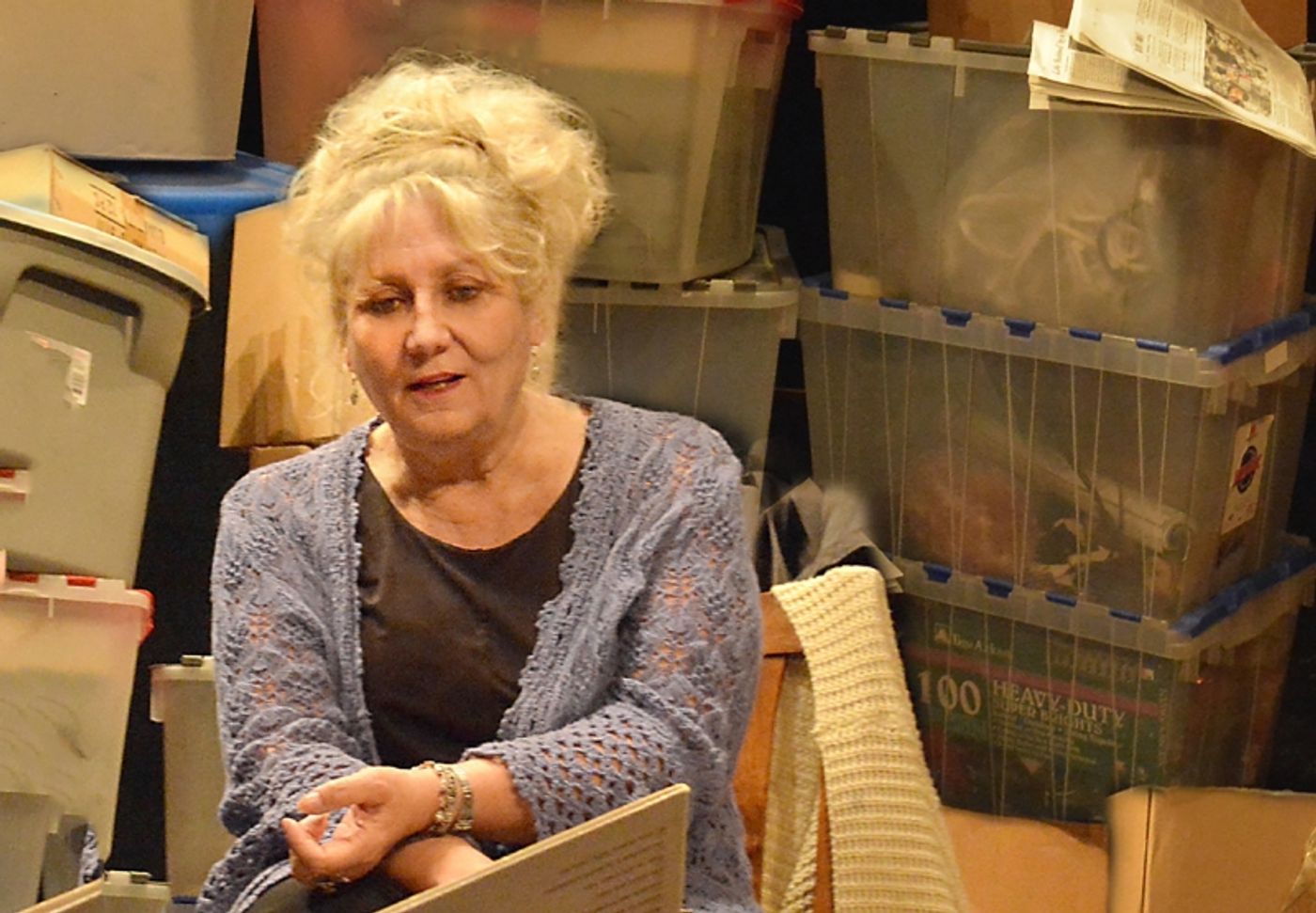
Suanne Spoke. Photo by Ed Krieger
Have you worked with any of these actors before?
I’ve known Suanne for almost 20 years, and I finally got to work with her in the last workshop for Exit Wounds. A finer actress you will not find and I cannot count enough superlatives about her. She’s a marvelous, consummate actress who never has a false moment, devotes herself entirely to her art, and can go from breaking your heart to making you laugh uproariously and back again in an instant. With Suanne you are seeing a real-life person onstage, not just an actress. I haven’t worked with Michael or Hayden before, but they both gave wonderful, standout auditions, great first readings at the table read, and I’m excited to see their performances and get to know them better. I’m already a fan!
Were you involved in the rehearsal process?
I was involved in casting and I was at the first table read and rehearsal. I haven’t been back since, but caryn has been keeping me updated and in the loop. caryn has made me very welcome on all levels, but given the short rehearsal time, I’ve put it in her capable hands and trust her completely since she and I are totally in sync.
Was there a specific “ripped from the headlines” sensationalist story of a horrific tragedy that inspired you to explore how entire families can become defined by the actions of one member, and how the fallout from one person’s act can affect future generations?
Sadly and tragically, there have been so many of them I could never pick just one! I am completely stymied, frustrated and enraged by the response of the Supreme Court as to questions of gun control and gun violence as well as that of a certain political party. They seem to want to encourage more and more violence, more and more guns – yet every time there is another horrifying incidence of gun violence (say, for example, every day) their response is to loosen up controls.
The town was inspired by Sandyhook. The aspect of the play about seeing a member of a family through the lens of another family member was inspired by me. That was my experience growing up: one of my parents saw me through the lens of my grandmother, his mother, with whom he had a very contentious, ambivalent relationship. Surprisingly, Danny is the “Me” character.
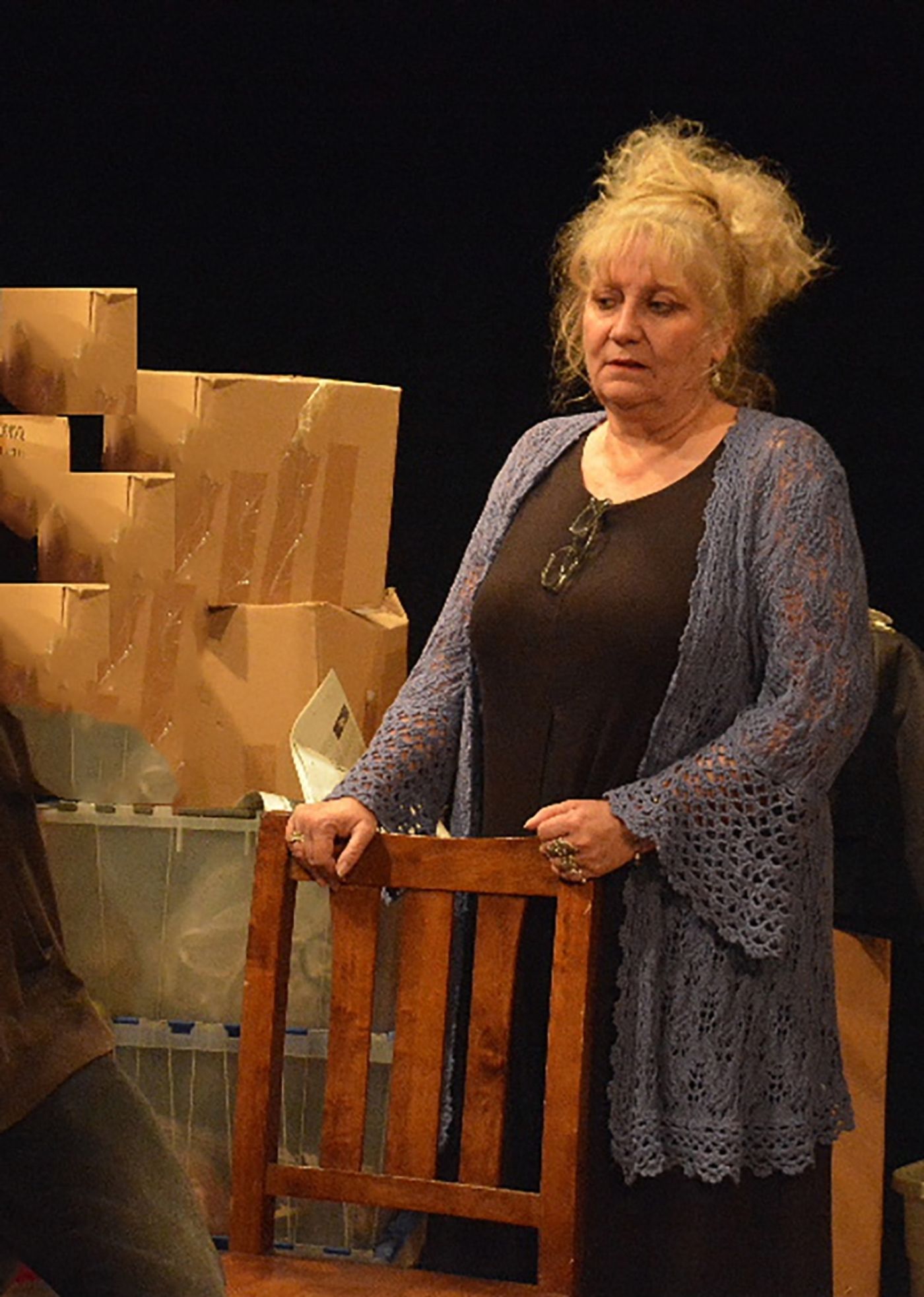
Suanne Spoke. Photo by Ed Krieger
Did part of your research before writing the play involve interviewing real members of families involved with the ramifications of a violent crime?
Yes, but mostly from vast research. I did go back and refer to several interviews I conducted as a P.I. and watched hours and hours of You Tube interviews with real members of families involved in mass shootings. I read countless books, articles and interviews on the subject.
How has the play evolved as instances of violent crimes often dominate the news?
I wrote the play in 2017, before the every-single-day rise in mass shootings. It was then I set the timeline for the event 25 years back, before there would be a digital footprint from the shooter, before the law was in some cases arresting the parents, long enough for Matt to have a 17-year-old son. When I came back to the script after Covid, there was some discussion about moving it to present day, but it screwed up my timeline. We decided 2017 still felt right.
What do you hope audiences will be talking about as they leave the theater?
I am constantly asked, “what do you want the audience to take away with them?” As always, I don’t presume to offer answers, only questions. I have no agenda for what I want the audience to take away with them except to see the truth of human behavior and something of their own humanity; to see something of themselves reflected on the stage and in one way or another understand it, not necessarily condone nor accept it, but understand it. My plays are often challenging, provocative, dangerous, and always ask hard questions. I do not provide answers but aim to have the audience talk about the play on the way home, argue it out, go across the street and have a drink and discuss it. I leave it up to the audience to provide their own answers. I hope it will start conversations about why, and maybe if we can talk about why and try to understand it, then maybe we can start to change it.
Hayden Kharrazi, the young actor playing Danny, said it very well: “I hope this play will ignite conversations amongst family, friends, and peers about the current crises our country is facing involving mental health and gun control. Don’t be afraid of conversation. Conversation is the first step to progress.”
Does ICT plan to hold after-performance talkbacks to hear what the audience has to say?
Yes, at the September 3 performance. I always look forward to these talkbacks!
As a member of the Ensemble Studio Theatre/LA and Pacific Resident Theatre writing units, and of the Dramatists Guild of America, would you like to share any thoughts about the ongoing WGA strike?
I am also a member of WGA and SAG/AFTRA and stand completely with our demands.
Anything else you would like to share about yourself, the play, or future creations in the works?
Exit Wounds is not a play about guns. It is not a platform nor lecture on gun control. It is a story about a scarred family learning to heal. I like to compare the Sadowski family’s journey to an old Japanese custom in which the cracks in a broken vase or dish are filled with gold because it’s important to recognize the cracks. I think of the Sadowski family as a broken plate since the cracks will always be there. The play’s ending isn’t wrapped up neatly, but it is redemptive.
Sadly, the play is as timely as when I wrote it, if not more so. The no longer shocking acts of violence that have become commonplace today is why plays like this must be done, why we must confront this. Theater forces us to do that, to focus on the humanity of it. Learning about other people is the best hope we have for change. I do believe we still have an enormous capacity for empathy if we choose to tap into it. There’s so much that we have in common and so much we can learn from each other.
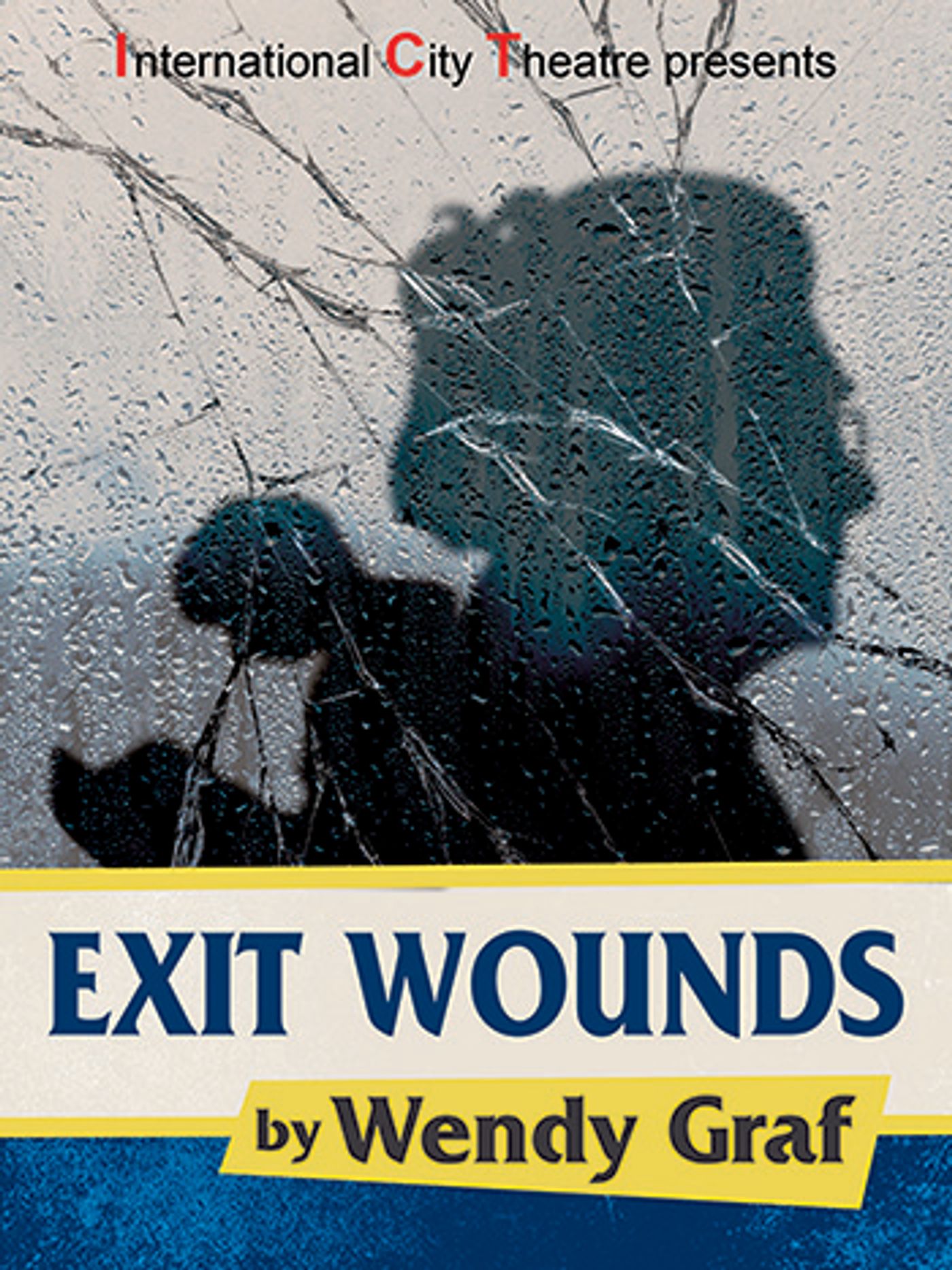
Exit Wounds runs Thursdays, Fridays, and Saturdays at 8 p.m. and Sundays at 2 p.m., August 25 through September 10 at International City Theatre, located in the Long Beach Convention & Entertainment Center at 330 East Seaside Way, Long Beach, CA 90802. Two preview performances take place on Wednesday, August 23 and Thursday, August 24 both at 8 p.m. Tickets are $49 on Thursdays, Fridays and Saturdays (except August 25, opening night, for which tickets are $55 and include a post-show reception), and $52 for Sunday matinees. Low-priced tickets to previews are $37. For more information and to purchase tickets, call (562) 436-4610 or go to www.InternationalCityTheatre.org.
Videos

